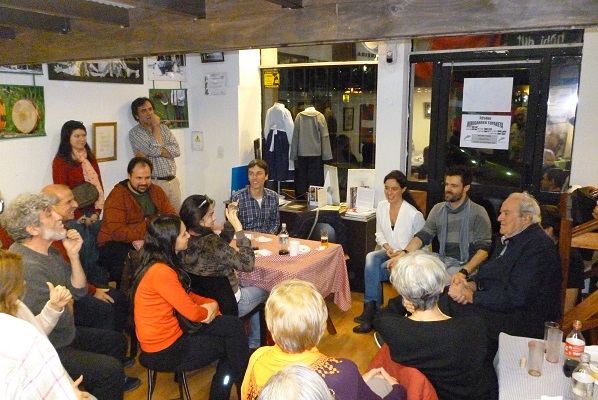basque heritage worldwide

04/16/2014

ADVERTISING
Buenos Aires, Argentina. As reported by EuskalKultura.com the film Asier ETA biok debuted in Argentina at the BAFICI Festival. Its directors, brother and sister, Aitor and Amaia Merino traveled to the capital especially for the presentation which also allowed them to witness how the film was received by local spectators.
The screenings took place in a full room with a very diverse audience that included filmmakers and human rights associations as well as members of the Basque diaspora. According to Aitor Merino “The film was very well-received by the audience. There were differences between the screenings in that the first two were attended mainly by Argentineans, something that can’t be known for sure but what I supposed by the questions that were asked, as people who were not aware of the conflict. My sensation was that they were very surprised that these things took place in a European country, especially in the Spanish State that is considered a model for Latin America. Especially in the beginning when we announced that Asier had been in prison and the reasons why he was in prison, there was a general sense of surprise, almost disbelief,” he said.
After the BAFICI, the Diaspora
After the function on the 12th, completing the film’s journey at the BAFICI, amaia and Aitor visited the Euskaltzaleak Basque language academy and association of Buenos Aires where they had dinner and participated in an extensive debate that resumed the proposed schema for the film among other topics. In this way, questions like “the controversial figure of former Judge Baltasar Garzon, the need for more dialogue from non-extreme entities, the gap of information about what happens in the Basque Country in both Argentine and Spanish media created by media of both countries, or the responsibility of each to do everything possible to get the story out.”
“Everyone needs to do what he/she can, in our case we felt that we could bring something to those that surround us: our friends in Madrid, for example, so that they realize that what appears in Spanish media may be a skewed view of reality…we don’t mean to do more than that, so that they ask if maybe there is some reality that they are not aware of. That is why we were very careful. We made the film to generate questions from people who didn’t know anything and who were considered neutral when they really weren’t: people who are taking stands often without realizing,” said Amaia Merino when asked faced with the facts, what can be done.
The debate lasted nearly two hours and gave the floor to guests and the audience, with points of view and various experiences. As a reflection, the director of Asier ETA biok was against looking at reality through absolute perspectives. “You can’t think in black and white. I think the way to get along with each other, because others suffer as well is to think that there are grays. If I want someone who thinks differently than me listens, I can’t yell and insult hem. I have to try to find what brings us together to then later say, ‘this is what separates us.’”
Finally, among questions asked, and keeping in mind that Aitor has lived in Madrid and Amaia has been in Ecuador for more than twenty years, people wanted to know what made them decide to work together on this project. “Because we are offspring of the same parents and from the same country: we lived the same, and above all we are both very good friends of Asier: to talk about Asier is to talk about ourselves,” they responded.
Screenings at Basque clubs
Even if the directors wanted the film to be seen by folks who are not steeped in the subject, the possibility of it touring Basque clubs is something “unexpected and at the same time amazing,” for its creators. “We want it to be seen in the clubs. It has a lot to do with the permissions received by the distributor but we think that there won’t be any problem since it won’t be a money making activity. For us, we will do everything we can to get permission,” said Aitor.
Finally, and as part of the debate, representatives of the local group “A casa/Etxera” for Human Rights and for the Basque prisoners invited the audience to join in a activity that began a year ago and consists of establishing pen-pals for Basque prisoners and their families. In the beginning letters were addressed to prisoners who were affected by illness, but now the scope has widened. They explained that anyone who would like to join in and participate can communicate with members of the group via email: colectivoacasa@gmail.com.
ADVERTISING
ADVERTISING
ADVERTISING
ADVERTISING
ADVERTISING
© 2014 - 2019 Basque Heritage Elkartea
Bera Bera 73
20009 Donostia / San Sebastián
Tel: (+34) 943 316170
Email: info@euskalkultura.eus